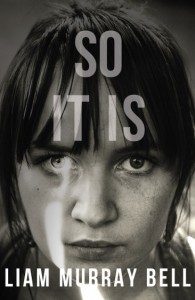 Published by Myriad Editions 14 June 2012
Published by Myriad Editions 14 June 2012
352 pp, paperback, £8.99
Reviewed by Hilary Laurie
In recent years Northern Irish writers have tended to avoid subjects close to home, fearing a lack of perspective and that they might be lured into taking sides. Liam Murray Bell, a Scotsman by birth but who was at university in Belfast, has no such reservations. He has plunged in headlong, setting his first novel So It Is in Belfast in the 1980s and 90s, when the Troubles are at their height and the Unionist and Nationalist communities at each other’s throats.
He knows the place and its people well and he has a good ear for the particularities of Ulster speech. Men come home from the pub ‘stocious’ or ‘with the stink and slur of drink’ on them, and a young boy is told by his sister, ‘Go you to the shop and get a tin of corned beef for our dinner.’ As events unfold, Brown never lets us forget where we are in this city of invisible boundaries where it is dangerous, sometimes fatal, to stray far from one’s own.
He knows how to tell a tale. He has said elsewhere that he is interested in the idea of women becoming involved in violence. For most of So It Is two stories run in parallel – that of Cassie, a vengeful, Republican paramilitary who sets honey traps for Protestant men guilty of murder and violence against Catholic Republicans, and of Aoife, a young Catholic girl whose life is gradually warped by the Troubles and what they do to her family. Cassie’s appearances in the narrative are brief and deeply shocking; the risks she runs and the torture she inflicts make for very painful reading. One can’t help reflecting that Stieg Larsson and his heroine Lisbeth Salander have much to answer for.
Aoife’s story moves at a slower pace through well-worked (if sometimes overlong) set pieces. Her mother suffers a mental collapse after a stray remark that she made led to the death of a neighbour; her feckless father will not step in to take charge of his family. Her young brother becomes involved with the Provisionals and finds himself in a confrontation with the police. A rubber bullet leaves him blind in one eye and this leads him to take his own life. Aoife, determined and resourceful soldiers on, but she refuses to accept her brother’s death and the agreed ceasefire. She knows that she will not get justice from either side. And so both women, Cassie and Aoife, come together and merge. Their stories finish in shocking violence as well as with the recognition that violence is not an answer. It’s an ending with no winners. Women, Bell would have us believe, are here no different from men.
He has written a challenging political thriller cum coming-of-age story. He does not hold back and at times he asks a lot of his readers. Often I wished for a lighter touch, for a more shaded point of view. He gives a vivid account of one of Northern Ireland’s two communities, but we are shown very little of the other side. But he leaves us in no doubt that both communities have suffered terribly and that choosing how to respond is no easier for one than the other.
